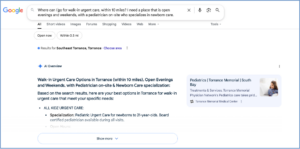Click here to chat with me!
Search our website now
Latest Posts
In recent years, AI communication tools have helped healthcare workers manage patient questions, track health, and improve follow-up care. These systems use chatbots and automatic text messages to talk with patients by sending reminders, answering questions, or checking how patients feel. For example, Penny is an AI text messaging system used at the University of Pennsylvania’s Abramson Cancer Center. It contacts patients taking oral chemotherapy every day to confirm their medicine schedules and learn about their physical and mental health. This daily contact alerts doctors if there are any problems, which can reduce the need for hospital visits. Also, Northwell Health uses special chatbot programs for patients with different medical conditions, such as postpartum care and chronic illnesses. These chatbots ask specific questions and watch patients after they leave the hospital, helping to prevent problems that might cause patients to come back to the hospital. At UC San Diego Health, chatbots inside the MyChart patient portal create drafts for answers to non-emergency patient messages. Clinicians check and fix these answers to be accurate and caring. These examples show how AI communication systems can handle many patient messages, especially those that do not need urgent attention, while helping doctors and improving patient care. Improving Patient Outcomes Through AI Communication One main goal of AI communication systems is to help patients get better care by checking on them more often between visits. The time just after leaving the hospital or during treatments like chemotherapy is very important. AI chatbots keep track of patients by checking in regularly. This helps find early signs of problems. Lawrence Shulman, MD, from the University of Pennsylvania’s Abramson Cancer Center, says that new cancer treatments let patients take medicine at home. But doctors might not see these patients for weeks, which creates a gap in communication. Penny fills this gap by contacting patients every day. This makes it possible to find symptoms or side effects early and act quickly. At Northwell Health, AI chatbots help patients after leaving the hospital for many conditions. The system asks condition-related questions, watches health, and alerts doctors if needed. This reduces hospital readmissions, which is important for good care and less cost. UC San Diego Health uses AI chatbots in MyChart to help answer patient questions faster. When chatbots write replies to questions about things like appointment scheduling or test results, patients get quicker answers. Fast replies help patients take part in their care, which can lead to better health. A study at UC San Diego Health found that 78.6% of patients preferred chatbot replies over those from a doctor. They said the chatbot answers showed more care and detail. This means patients like quick answers and the friendly way chatbots respond. Enhancing Patient Satisfaction with AI Communication Patient satisfaction means how happy patients are with their care and communication. AI communication systems can improve this in many ways. Chatbots let patients reply when it is convenient for them. Research shows patients like texting more than phone calls. Texting lets them answer when they want, which lowers stress and missed calls. Chatbots can give longer and more detailed answers. Doctors sometimes give short replies because they have many messages to answer. Chatbots help patients understand better and avoid asking the same questions again. Being open about chatbot use and privacy is important for trust. Patients should choose to use chatbots and know how their data is handled. Keeping privacy and explaining AI’s role helps patients feel safe. Doctors review chatbot replies before they are sent to make sure they are right and sound caring. This keeps a human touch and makes patients feel cared for. By making communication easy, clear, and reliable, AI tools improve patient satisfaction. Happier patients often follow treatment plans better and stay healthier. Supporting Clinician Efficiency and Reducing Burnout Doctors often have too much work from answering many patient questions, checking up, and paperwork. AI communication systems help by taking care of routine tasks and sorting patient questions. Jeffrey Ferranti, MD, says many doctors feel tired and stressed after the pandemic. AI tools let doctors spend more time with patients instead of doing paperwork. By letting chatbots handle non-urgent questions, clinicians save time. At UC San Diego Health, chatbots write drafts for MyChart messages. This helps doctors spend less time typing answers. It makes work go smoother and helps doctors manage patient communication better. But doctors still need to check chatbot answers to keep them correct and proper. Christopher Longhurst, MD, says doctors must stay involved to make sure AI supports human decisions and does not replace them. Using AI for patient communication can lower doctor burnout. It lets doctors focus more on hard clinical work and patient care. AI and Workflow Integration in Healthcare Communication Systems Healthcare groups in the United States must connect AI tools with their current work methods and technology. This helps make AI useful and easy to use. Many healthcare providers use Electronic Health Records (EHRs) and patient portals like MyChart to handle data and messages. Adding AI chatbots to these systems allows smooth communication. For example, UC San Diego Health’s chatbot is built into their patient portal. This means doctors and patients use AI within systems they already know. AI helps without causing problems or extra work. Automation using AI can include: Automatic reminders to take medicine Regular checks on symptoms through surveys Reminders after appointments or procedures Rules to notify doctors if warning signs appear during chatbot chats This kind of automation helps keep timely contact with patients and finds issues early without always needing doctor availability. Good integration also means training staff to understand how AI works and handle unusual cases. IT managers must make sure AI keeps patient data safe and follows privacy laws like HIPAA. Practice leaders should create clear rules for when and how AI communication is used with patients. This includes getting patient permission, being open about data use, and keeping doctor review of all messages. When done carefully, AI systems improve workflow, reduce
Ahead of Intelligent Health (13-14 September 2023, Basel, Switzerland), we asked Yurii Kryvoborodov, Head of AI & Data Consulting, Unicsoft, his thoughts on the future of AI in healthcare. Do you think the increased usage of Generative AI and LLMs will have a dramatic impact on the healthcare industry and, if so, how? Generative AI is just a part of the disruptive impact of all AI tech on the healthcare industry. It allows to dramatically reduce time efforts, costs and chances of mistakes. Generative AI and LLMs are applied to automating clinical documentation, drug discovery, tailoring of treatment plans to individual patients, real-time clinical decision support and health monitoring, extracting valuable insights from unstructured clinical records, streamlining administrative tasks like billing and claims processing, providing instant access to comprehensive medical knowledge. And this list continues.
We sat with Benjamin von Deschwanden, Co-Founder and CPO at Acodis AG, to ask him his thoughts on the future of AI in healthcare. Do you think the increased usage of Generative AI and LLMs will have a dramatic impact on the healthcare industry and, if so, how? I think that the strength of Generative AI lies in making huge amounts of information accessible without needing to manually sift through the source material. Being able to quickly answer any questions is going to be transformative for everyone working with increasingly bigger data sets.The challenge will be to ensure that the information we get by means of Generative AI is correct and complete – especially in healthcare – as the consequences of wrong data can be fatal. We at Acodis are actively working on practical applications of Generative AI inside our Intelligent Document Processing (IDP) Platform for Life Science and Pharma clients to drive efficiency and accelerate time to market, whilst controlling the risks.
Intelligent Health 2024 returns to Basel, Switzerland on 11th–12th September. We’ve got prominent speakers. An extensive programme. Groundbreaking advancements in #HealthTech. And much, much more. Our incredible 2024 programme will dive deeper than ever before. From sharing the latest innovation insights to exploring use cases of AI application in clinical settings from around the world. All through our industry-renowned talks, limitless networking opportunities, and much-loved, hands-on workshops. Read on to discover what themes await at the world’s largest AI and healthcare summit.
We sat down with Margrietha H. (Greet) Vink, Erasmus MC’s Director of Research Development Office and Smart Health Tech Center, to ask her for her thoughts on the future of AI in healthcare. Do you think the increased usage of Generative AI and LLMs will have a dramatic impact on the healthcare industry and, if so, how? The integration of Generative AI and LLMs into the healthcare industry holds the potential to revolutionise various aspects of patient care, from diagnostics and treatment to administrative tasks and drug development. However, this transformation will require careful consideration of ethical, legal, and practical challenges to ensure that the benefits are realised in a responsible and equitable manner.










